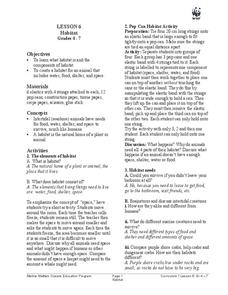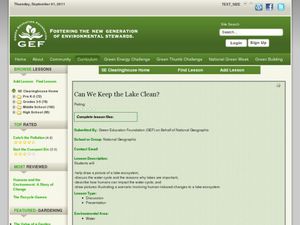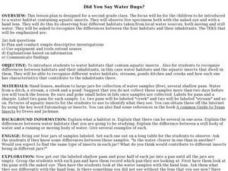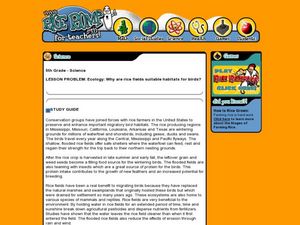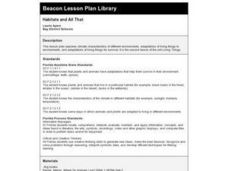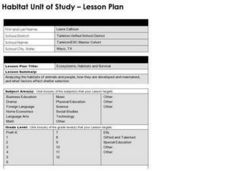Florida Department of Environmental Protection
Water's Journey Expedition
Step into a scientist's shoes to go online and discover the Florida Springs Expedition, and participate in two activities focusing on how humans impact the environment. The first activity asks scholars to summarize the six...
Curated OER
Habitat
Young scholars explore the attributes of animal habitats. In this habitat lesson, students examine animal habitats as they conduct a scientific investigation to create an animal habitat that provides food, shelter, and space.
Curated OER
Habitat
Pupils are able to define habitat. They are able to identify the four things that living things need to survive. Students are able to describe how living things are adapted to their habitats.
Curated OER
What's That Habitat?
Fourth graders explore the environment by researching animal characteristics. In this habitat identification lesson, 4th graders utilize paper and crayons to illustrate their own habitats or homes and discuss what it contains that is...
Curated OER
Oceanic Habitat Zones
Students explore ocean habitats. In this oceanic environment lesson, students research various habitats in the ocean. Then, in a jigsaw format, students teach others in the class about the habitat they researched.
Curated OER
Habitat, What is That?
Young scholars explore animal habitats. In this environmental stewardship lesson, students match animals to their habitats in a classroom activity. Young scholars also observe a firefly habitat and read Fireflies. Students create...
Curated OER
Protecting Habitats and Species
Students recognize that scientists continuously gather and interpret data to understand and predict relationships among natural phenomena. They research various volcanoes and plot the volcano locations on a world map.
Curated OER
A World in a Grain of Sand
Students go exploring Britain's beaches. In this geography lesson, students visit selected websites to learn about specific beach habitats and the history of cleaning those beaches.
Curated OER
Can We Keep the Lake Clean?
Students are introduced to the water cycle. They help draw a picture of a lake ecosystem, adding human impacts that affect water quality. Students help fill in the components of a drawing of a water system. At the end of the lesson...
Curated OER
Types of Pollution
Students differentiate between various types of water pollution and complete a Venn diagram with the information. They consider why there are laws regulating the release of pollution in water and discuss solutions to pollution problems.
Curated OER
You Can Change the World
Students discuss ways they can help protect the environment. In groups, they examine various types of animals and identify their characteristics, food and habitats are compared. They create a Hyperstudio presentation in which they scan...
Curated OER
Did You Say Water Bugs?
Second graders observe live specimens of aquatic insects in a water habitat. They study specimens from both moving and still water with the naked eye and a hand lens.
Curated OER
Mixed Media Ocean Art
Students design pictures of ocean environments. In this art lesson, students use mixed media art materials to develop a picture that depicts the ocean environment. They use paint, sand paper and various basic art materials.
Curated OER
Ecology: Why Are Rice Fields Suitable Habitats for Birds?
Fifth graders discover the uses for rice by reading about the habitats of certain birds. In this agriculture lesson, 5th graders research birds from the Gulf Coast and California and their reasons for living in rice fields....
Curated OER
Habitats and All That
First graders read books, complete online explorations and discuss the ways in which animals adapt to their habitats in order to survive. They create accordion books, play matching games and dramatize animal adaptations.
Curated OER
Aquatic Habitat Water Quality Experiment
Fifth graders discuss the importance of water quality for humans and fish and make predictions about what happens to water that is polluted. In small groups, they conduct experiments to compare and contrast water that is unpolluted and...
Curated OER
Water Pollution
Pupils investigate a variety of pollutants that can affect water and the plants and animals that live in the water. In this water pollution lesson plan, students identify pollutants in a bog, marsh, stream or other wetland area and...
Curated OER
Ecosystems, Habitats and Survival
Students analyze the habitats of animals and people, how they are developed and maintained, and what factors affect shelter selection. They create a classified ad that describes a specific animal's habitat.
Curated OER
Biodiversity in Illinois-Pond Habitats
Second graders construct a pond habitat in the classroom using a small swimming pool partially filled with water, real cattails, a tree log adjoining, and plastic animal life appropriate to a pond setting. They examine the frog in detail...
Curated OER
"Habitats"
Students complete a unit of lessons on animals and animal conservation. They observe a square meter of ground outside the school, set up a model environment, analyze an owl pellet, grow bread mold, and explore various websites.
NOAA
It's a Roughy Life
Scientists recently discovered several previously unknown species at the Bear Seamount off the coast of New England. Scholars research these new species — benthopelagic, benthic, and seamount fish — and find out what makes them...
NOAA
Through Robot Eyes
How do robots assist ocean explorers in collecting data and images? The final installment in a five-part series has science scholars examine underwater images collected by robots and identify the organisms shown. Groups then calculate...
ARKive
Adaptations for Movement
What animals are best suited for moving around a rainforest, or a desert? Design your own animal species based on a particular habitat, focusing on the characteristics it will need for optimal movement. Great as a group lesson or...
Alabama Wildlife Federation
Life in a Pond
What living things call an aquatic habitat home? Young learners consider the question after they discuss the characteristics of a typical pond habitat. They identify an animal and then determine if a pond would have all the components to...
Other popular searches
- Animals Water Habitats
- Animal Water Habitats
- Land or Water Habitats
- Shallow Water Habitats
- Water Habitats Lesson Plans
- Describe Water Habitats
- Water Habitats Rivers



